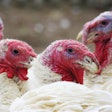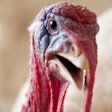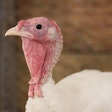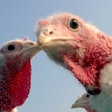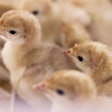The USPOULTRY Board Research Initiative is requesting pre-proposals in two areas – poultry lighting and improved measures controlling blackhead disease in turkeys and chickens. The deadline for pre-proposal submission is November 1, 2019.
Poultry Lighting
Broiler and turkey producers commonly use low level light intensity to improve flock efficiency and welfare outcomes. Welfare benefits associated with reduced light intensity include calm behavior of flocks (less flightiness), reduced injuries due to scratches and moderated growth rate. Animal welfare groups and some retailers advocate for the use of higher light intensity, arguing that higher light intensity stimulates more natural behavior in flocks. Some groups are also advocating for the use of windows to allow the birds to have exposure to natural light, which may result in areas of a broiler and/or turkey house being illuminated by 4-6 FC of light on a sunny day.
There are three areas of focus for this pre-proposal. The first is establishing objective measures to evaluate the impact on broiler and/or turkey welfare by light intensity. These objective measures should address bird behavior, mortality, categorization of reasons for culling, leg health, skin health and cardiovascular health. The second objective is a comparison of objective measures of welfare in broilers and/or turkeys grown with different light intensities, and the third objective is a comparison of objective measures of welfare in broilers and/or turkeys grown with different types of light sources.
Improved measures controlling blackhead disease in turkeys and chickens
Blackhead disease is an important disease in the commercial turkey and chicken industries. The disease is introduced to turkeys by transmission of the eggs of the cecal worm, Heterakis gallinarum, by contact with chickens or chicken litter. This worm acts as the intermediate host of the parasite, Histomonas meleagridis, causative agent of blackhead disease. The only chemotherapeutic agents available to prevent or treat blackhead disease have been withdrawn from the market. Effective vaccines to prevent blackhead are not available.
There are three areas of focus that include the development of vaccines and vaccine strategies to prevent blackhead disease in turkeys and chickens; identification of alternative chemotherapeutic agents to control blackhead disease in turkeys and chickens; and identification of potential insect vectors of cecal worms in turkeys and chickens.
For more information, click here. Or go to www.uspoultry.org and click on “Research” for complete instructions and deadlines.
The USPOULTRY Board Research Initiative was created by the boards of USPOULTRY and the USPOULTRY Foundation to address current issues facing the poultry industry. The USPOULTRY Board Research Initiative operates alongside the current USPOULTRY comprehensive research program and augments the great success of the existing program by focusing additional resources toward defined areas of research.
USPOULTRY and its Foundation operate a comprehensive research program incorporating all phases of poultry and egg production and processing. Since the inception of the research program, USPOULTRY has reinvested more than $32 million dollars into the industry in the form of research grants. More than 50 universities and federal and state facilities have received grants over the years.










